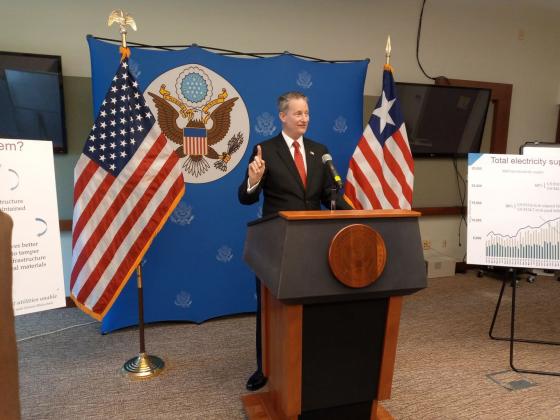Failure to Fight Human Trafficking Is Borne out of Other Failures

US Ambassador Michael McCarthy
In the July 5 edition of the Daily Observer, the U.S. States Department came out with criticism against the Liberian Government and downgrading the Weah Administration to Tier 2 Watch List for failing to “Meet the minimum standards for the elimination of trafficking.”
The report indicates that while the Weah Administration is on record for identifying a few traffickers, investigating and prosecuting a few defendants, but with no convicts in the process. The report furthers that law enforcement officials continually demonstrate lack adequate resources and understanding of trafficking to effectively investigate and prosecute trafficking crimes.
The report follows praises Liberia received just one year ago, when the U.S. Government took the country from the bottom of Tier Watch List to Tier 2 on the Trafficking List, urging the government to continue the improvement to ascend to Tier 1.
The fluctuating grades received by Liberia in the annual Human Trafficking reports indicate failures that President Weah needs to address sooner and not wait to impress Liberians during a political season.
Upon taking the helm of national leadership in 2018 in an environment of overwhelming euphoria, President Weah promised Liberians many things that gave them high expectations.
For instance, the fight against corruption, making Liberians not to be spectators in their own economy, creating job opportunities for youths, strict adherence to the dictates of the Liberian Constitution, and fostering justice for all Liberians regardless of creed, religion, and tribal background, were some of the promises.
Corruption, the first vice with reflections on every social behavior the President promised to fight, has seemingly become a best friend that government officials are consulting nowadays for the use of public funds. The first thing the Weah Administration failed to demonstrate in the fight against corruption was to audit the past administration to establish how it used Liberia’s resources for the twelve-year period. Instead, the President, in his first state of the nation address, cast a blanket statement that his government met a “Broke” economy with nothing in the coffers; a comment that former President Ellen Johnson Sirleaf debunked and stated publicly that US$150 million was left in the state coffer.
The former President, amid the debate, stated that everything her administration did was recorded and the records were at the Ministry of Finance and Development Planning, referring the government to it for perusal. The Weah administration, with this challenge, failed to audit the government but relied on a mere accusation without proof that the past administration ruled for twelve years with nothing to show.
Furthermore, the current administration has come under grave allegations of corruption ranging from the alleged disappearance of billions of Liberian dollars and mismanagement of millions of US dollars of public resources in other smaller entities of government since taking the helm. Bribery has become a custom that, before any public service is rendered for an individual, he or she must bribe the public servant in addition to paying the legally prescribed fee for the service. Last year there was a big scandal in the Division of Passports at the Foreign Ministry. Just weeks ago, the managing director of the Liberia Water & Sewer Corporation (LWSC) attempted to single-handedly approve the transfer of US$99,000 to a shady offshore account. Granted, the President suspended the senior officials involved and forwarded them for investigation, but we have heard nothing further since.
The President himself, amid public outcry, has erected a string of more than 40 condominiums and turned his 9th Street property into a modern mansion -- all of which has transpired without him having declared his assets, and with no transparency to determine the source of the money used to carry out these lavish real estate projects. And given the harsh economic conditions in the country, such brazen flouting of accountability and transparency systems causes the general public, including civil servants who have been constantly agitating for unpaid salary arrears.
Regarding reconciliation and unity of the country, the President promised to treat every Liberian equal without any form of discrimination. This statement was in consonance with Article 5 (c) of the Liberian Constitution that mandates the Republic to take action to eliminate tribalism, sectionalism, and all forms of corrupt practices. During his first state of the nation address in 2018, President Weah read the constitution extensively and said Liberians should get ready to observe and respect everything written therein.
Today, the formation of the government is contrary to this promise by the President. Those at the helm of the House of Representatives and Senate are southeasterners; most of the top ranking ministerial and director positions are occupied by tribes from the southeast -- Kru, Krahn and Grebo. Additionally, other appointments in government only take into consideration partisans of the Congress for Democratic Change (CDC) exclusive of other Liberians who are qualified with the constitutional right to work. The party chairperson, Mulbah Morlu, was seen at certain times taking long lists of partisans to various ministries and agencies pressurizing heads of those agencies to employ them.
Since the Weah administration came to power almost four years now, no middle class Liberian businessman or woman has emerged after criticizing the past administration of not doing much to empower Liberians to take over their own economy. Justice on the other hand has turned icy that the credibility and integrity of the Judiciary have been called into question.We at the Daily Observer believe that the failure of the Weah Administration to fight Trafficking to a satisfactory level as flagged out by the U.S. State Department is a manifestation of many failures the government has sustained. We are also hopeful that President Weah, with the time in his possession, can take corrective measures, not necessarily for a political reason but in fulfilment of his promise to the Liberian people and his own legacy.

